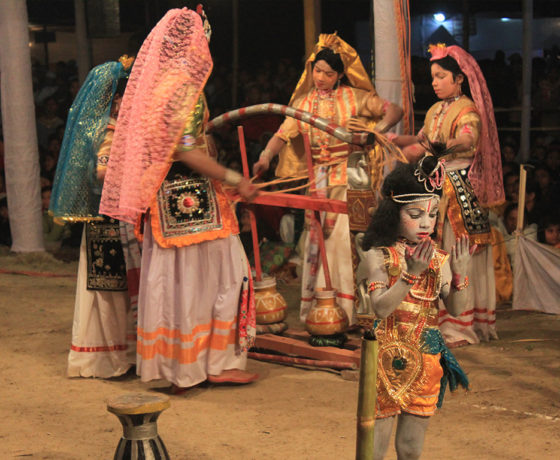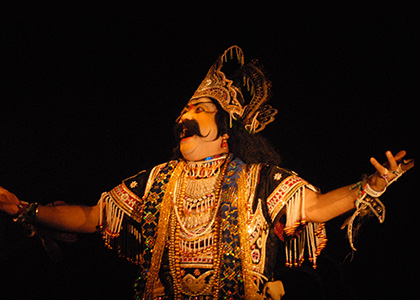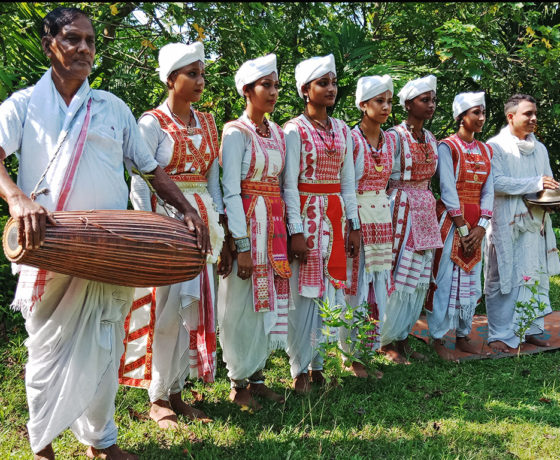Cultural Adventure/Cultural Tour/Festival Tour.
Cultural Adventure/Cultural Tour/Festival Tour
The culture of Majuli is well known all over the world. Majuli boasts of a diversity of ethnic tribes, which have contributed immensely to its rich and colourful heritage. The living style of tribal and non-tribal communities composed an extra cultural identity of Majuli Island. Assimilation of tribal and non-tribal culture in this island is a rare example. Moreover, the typical house types, weaving skill of women, songs and festivals related to their lifestyle and farming habits of tribal communities in Majuli are undoubtedly very attractive; satras serve as important institutions that find the different castes and communities by regulating their social activities. For example,‟saachi manuscripts” (Brakes of a certain kind of tree upon which religious scripting were written) spacious antique artistic specimens significantly the famous ,‟Mask Culture” of Chamaguri Satra represents a kind of brilliant exposure to the tourists. The satras possess a handful of artists, skilful in making fans made of cane and slandering bamboo. These handicrafts of satras like Natun Kamalabari and Auniati have a worldwide acclamation. Moreover, the pottery and boat making culture of Salmora area are really a notable source of attraction to tourists from different parts of the world. The weaving cultures of Assamese women deserve immense popularity even in the international level. The artists uniqueness of, ‟Gamocha”, ‟Chaddar”, ‟Ribigaseng”, ‟Mibu – Galuk”, ‟Mirisim”, made by Assamese women (tribal and nontribal) brightness the possibilities of tourist attraction born far and near.
Majuli is also a treasure of different festivals. Major festivals of Majuli are as follows:
Pal Naam: Pal Naam is a succession of prayers – naam keton – performed continuously by the bhakats of a satra during the last five days of the month of Kati. This holy festival makes an earnest endeavor to explore the values of the sole which may bring about the ultimate salvation.
Raas Festival: Raas is essentially religious festival depicting the fun, frolic and other activities of Lord Krishna. Its main objectives are to forge a link between the soul-atma-and the almighty and raise the level of thinking from the mundane to the high level of spiritualism.
Bihu: It is the national festival of the Assamese people and is celebrated in a year. Bihu is splited into three kinds- the Rangali bihu, the Kangali Bihu, the Bhugali Bihu.The Rangali Bihu- the spring festival- is celebrated during the mid-April and is so called because of the festival of merriment. The Kangali Bihu is observed in the month of Kati or mid-Octber when food stuff becomes scarce. There is no merriment during this Bihu. People light earthen lamps affixed on bamboo poles, known as Akash Banti near the tulashi-basil-plants in their field and pray for a good harvest and full granary in the year ahead. The Bugali Bihu – the harvest festival – is celebrated during mid-January after the annual harvest and is a festival of feasting and merry making. Agni – the God of fire – is also worshipped.
Bishu Puja: A colourful Spring Festival of the Deori community, the term Bishu means extreme merriment. Like other spring festivals, it is also observed during mid-April seven days at a stretch, characterized by undertrained joy and merry-making.
Batho Puja: The spring festival of the Sonowal Kacharis with this ceremony, in which Lord Siva is worshipped. The term “Bathou” signifies Lord Siva.
Ali-Aye-Ligang: It is the festival signifying the seed-showing rituals of the Mising (Miri) Community. This most important and colouful festival the Mising is celebrated every year on the first Wednesday of the month of Fagun (February-March) with traditional pomp and gaiety. The ceremonial showing of paddy starts on this very day. The Gumrag Dance is performed by the young boys and girls during this festival. Oinitom- Mising songs- are also sung. Another important festival of the Mising is the Porag Festival, which is a harvesting festival in which women are honoured as symbol of fertility and productivity. The Misings are known also for the preparation of a special kind of intoxicating drink called Apong .
In Majuli, other season festivals are also held continuously to run the heritage of the Island. Falgu Utsav, Janmastami, Bar-Sabha, Bhawana Samaruh(recently added by the Shri Shri Auaniati Satra) etc. season festivals are remarkable.
ATTRACTIONS
- Traditional Dance and Drama
- Tribal Rituals
- Our Festivals.
- Agriculture, Fishing, Animal Husbandry etc.




